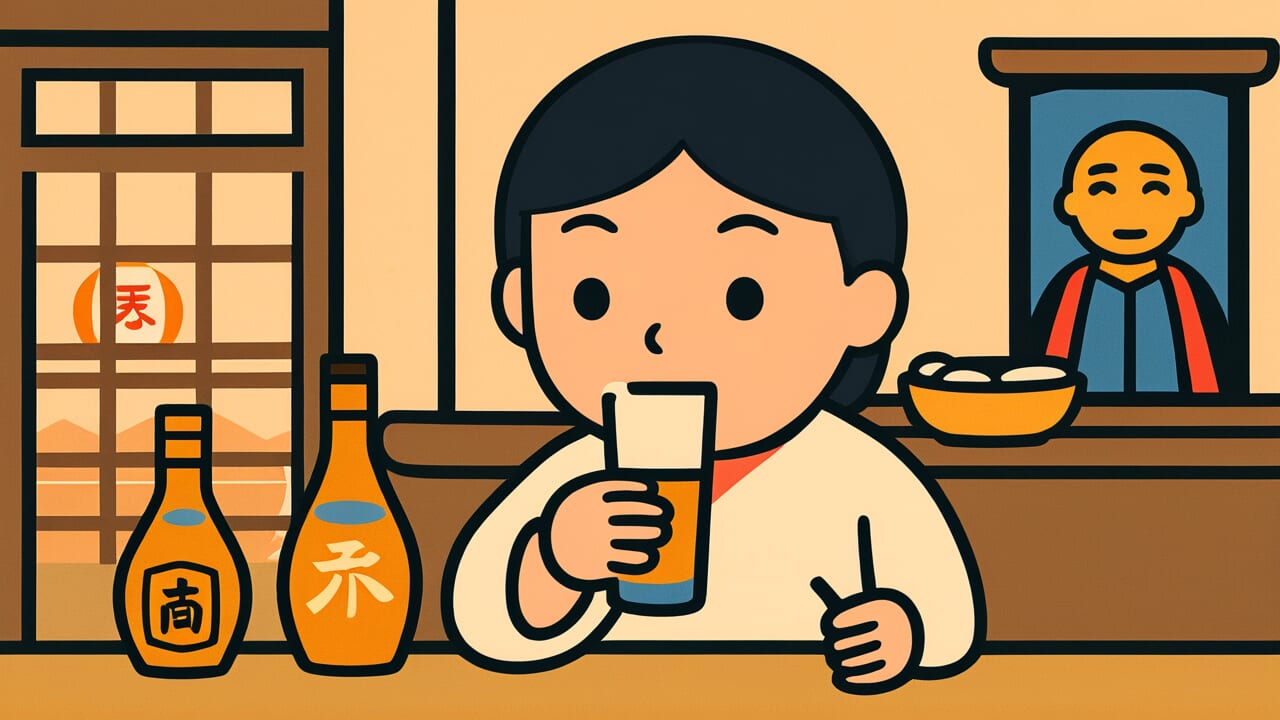How to Read “Sake from a sake shop rather than sake from sympathy”
Nasake no sake yori sakaya no sake
Meaning of “Sake from a sake shop rather than sake from sympathy”
This proverb means that practical benefits are more valuable than sympathy or kindness. It teaches that you should value reliable profits and real worth over depending on someone’s goodwill or sympathy.
People use this saying when teaching the importance of getting things through your own efforts rather than relying on others’ warmth. For example, it’s wiser to earn your own steady income than to put yourself in an unstable situation hoping for someone’s favor.
This expression works well because it uses the concrete example of “sake” to clearly contrast two opposing values: human emotion and practical benefit.
Even today, this lesson applies when you need to prioritize real benefits over emotional decisions. In business and life choices, it shows the importance of choosing long-term stable benefits over temporary sympathy or favors.
Origin and Etymology
Clear records about when this proverb first appeared don’t seem to exist. However, we can make interesting observations from how the words are structured.
The contrast between “sake from sympathy” and “sake from a sake shop” forms the heart of this proverb. Sake from sympathy means alcohol someone gives you out of pity or kindness. Sake from a sake shop means alcohol you properly bought with your own money.
This expression likely emerged from common people’s culture during the Edo period. It probably arose as commerce developed and a money-based economy took hold. People of that time used the everyday subject of “sake” to express the instability of depending on others’ goodwill.
They chose sake as an example because everyone was familiar with this drink. This made the lesson feel real and practical. Sake someone gives you is certainly appreciated, but you can’t count on always receiving it.
Sake you buy with money you earned yourself is reliable and comes with no obligations. This simple, clear contrast resonated with people’s hearts.
You can feel the influence of merchant culture that valued practical benefits. This expression captures the realistic wisdom of Japanese people who thought carefully about balancing human emotion with practical gain.
Usage Examples
- Rather than introducing a friend to a job out of sympathy, it’s better for everyone to properly evaluate their abilities and hire them—sake from a sake shop rather than sake from sympathy
- Earning money yourself is more reliable and less stressful than expecting help from your parents—sake from a sake shop rather than sake from sympathy, as they say
Universal Wisdom
A deep truth about human relationships hides behind why this proverb has been passed down through generations. Everyone feels joy when receiving kindness or sympathy from others. But at the same time, we instinctively understand the danger of depending on it.
Human kindness is beautiful, but it doesn’t come with guarantees of permanence. If the other person’s mood or situation changes, that kindness might disappear. Furthermore, receiving favors creates an invisible sense of debt. This psychological burden sometimes binds people more than material value does.
On the other hand, things you obtain through your own power come with freedom—you don’t need to feel obligated to anyone. This brings not just material wealth but spiritual independence. Human beings may essentially seek independence over dependence, and equal exchange over charity.
This proverb doesn’t advocate cold calculation. Rather, it offers wisdom for keeping relationships healthy. By choosing substance over emotion, you can actually build equal and refreshing relationships. Our ancestors packed the true meaning of independence and dignified human relationships into these few words.
When AI Hears This
When you receive sympathy, an invisible debt actually occurs. This debt is troublesome precisely because it has no clear repayment deadline or amount.
From a game theory perspective, transactions at a sake shop are straightforward. Pay 500 yen and you get 500 yen worth of sake. The transaction ends completely at that moment. We call this a “one-shot game.”
However, when someone gives you sake out of sympathy, a “repeated game” begins. The other person expects “they’ll return the favor someday,” while you keep worrying “when and how should I pay this back?”
What’s interesting is that this invisible debt accumulates interest. As time passes, the psychological pressure of “I still haven’t repaid this” grows. You also risk being seen as “ungrateful” if you don’t help when the other person is in trouble.
Behavioral economics research shows that humans tend to overestimate ambiguous losses compared to clear ones. In other words, the uncertain debt in human relationships feels psychologically heavier than the fixed cost of 500 yen.
Furthermore, “inflation” occurs in exchanges of sympathy. When you received one cup of sake initially, you might be expected to return two cups’ worth of kindness. Market transactions don’t have this kind of ambiguous multiplication.
This proverb demonstrates the rationality of humans instinctively avoiding the “complexity of emotional debt” and choosing simple monetary transactions.
Lessons for Today
This proverb teaches us the true value of independence. Getting “likes” on social media or being recognized by someone certainly feels good. But you can’t live your life depending only on that.
What matters is having the power to build something reliable yourself. Polish your skills, deepen your knowledge, and create a foundation to stand on your own feet. This might look unglamorous, but it becomes wealth no one can take from you.
However, this proverb isn’t telling you to reject people’s kindness. Rather, being independent lets you genuinely appreciate others’ goodwill. Because you’re not dependent, you can receive it with gratitude. And eventually, you’ll have the capacity to extend your hand to someone else.
Modern society is full of seemingly kind words and sweet temptations. But what truly supports your life is the ability and achievements you’ve built yourself. Don’t forget this, and keep walking the reliable path, one step at a time.



Comments